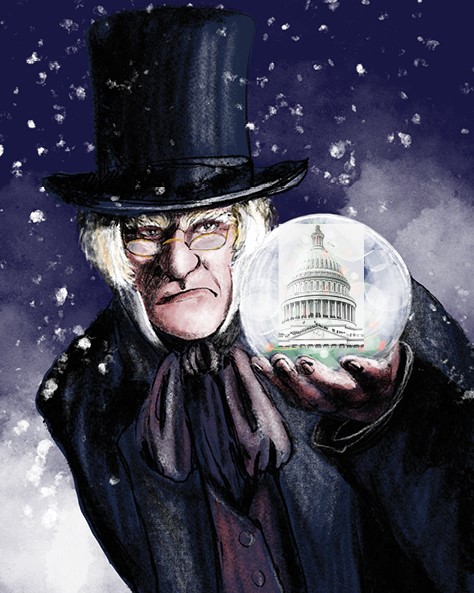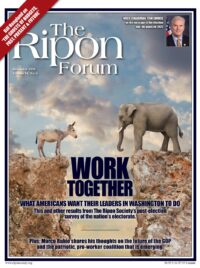
Ebenezer Scrooge would have certainly asserted of Congress’ budget process: “it is dead, dead as a door-nail.” In the spirit of the season, it is worth examining why the process now lies with old Marley in the graveyard.
I am visited by three apparitions of the federal budget process. The ghosts of budgets past, present, and future. As one who has lived in the past and present, “I will not shut out the lessons that they teach” but strive to apply them to the future.
The Ghost of Budgets Past arrives on steady and relatively calm winds, landing on the heels of a discredited Nixon Administration that historians characterized as the “Imperial Presidency.” An embarrassed and weakened legislative branch that had relinquished its responsibilities to the executive, wakes to its constitutional responsibilities and enacts the Congressional Budget and Impoundment Control Act of 1974.
New budget committees and an independent Congressional Budget Office are created to produce an annual budget blueprint, guiding spending and revenue decisions in an orderly and timely fashion. The ghost proclaims it mostly functioned as outlined in the 1974 Act.
Chopping winds, sometimes quite turbulent at times, nonetheless buffeted the Ghost of Budgets Past as we venture a little forward. On the 10th anniversary of the new law, it was observed that the process had been attacked from both within and without as repugnant, redundant, irrelevant, and misleading. But it also was acknowledged that the process provided a framework for congressional decision-making that was real and meaningful.
For nearly a quarter century, even with split parties in control of the Senate and House, and under both Republican and Democratic presidents, congressional budgets were adopted annually guiding spending and revenue decisions. The basic, inseparable functions of governing and budgeting were achieved. Only once in the first 26 years of the Budget Act, did Congress fail to adopt a budget.
For nearly a quarter century, even with split parties in control of the Senate and House, and under both Republican and Democratic presidents, congressional budgets were adopted annually guiding spending and revenue decisions.
The gentle specter of the past recedes as the 20th century comes to an end, and a loud and disorderly phantom approaches me. This is the Ghost of Budgets Present. A chill runs down my spine and “foreshadows certain ends,” for the bulk of the last 20 years, the budget process is entangled in gotcha political gamesmanship. The desired consensus-decision-making budget resolution is now an instrument of party campaign platforms, and only when one party controls both the House and Senate, does a budget blueprint emerge. But even then, it sometimes fails. As a result, over the last 20 years, Congress manages to agree on a government budget only half the time.
When the party in control of both chambers and the White House does agree on a budget, however, it is for ulterior reasons. Not to honestly reach even a top line blueprint on spending or revenues, but to use the process to activate procedures designed to enact highly partisan policies and avoid the challenging and difficult part of governing: finding compromise and bipartisan consensus. Thus, the Ghost of Budgets Present manipulates processes to guarantee the enactment of the Patient Protection and Affordable Care Act under Democratic controlled government, or in reverse under Republican control, attempts to undo that Act and pass revenue reducing tax cuts.
Partisan posturing further results in delays in annual appropriations and government shutdowns commence, the longest in the America’s history. The specter points silently to 1995 as the last time all appropriation bills passed before the beginning of the new fiscal year. In the mist, “regular order” recedes.
The Ghost of Budgets Present manipulates processes to guarantee the enactment of the Patient Protection and Affordable Care Act under Democratic controlled government, or in reverse under Republican control, attempts to undo that Act and pass revenue reducing tax cuts.
The Ghost of Budgets Present is lashed and whipsawed by crises. A Joint Committee on Budget and Appropriations Process Reform is formed in 2018 and proposes major changes but cannot reach the required voting threshold for adopting its recommendations. The outgoing Chairman of the Senate Budget Committee proposes reform legislation that is met with silence except for a few, brave rebellious souls.
The ghost, laden by the chains of failure, returns to the grave. It admonishes me as it departs that “unless these shadows remain unaltered by the Future” the process will die.
A new vision appears on the horizon, silently approaching, the Ghost of the Budgets Future. The apparition proclaims, “if the courses be departed from, the ends will change.” What changes, I ask?
Streamline and simplify, the vision responds. Collapse the House and Senate Budget Committees into a Joint Budget Committee. Make membership on the Joint Committee the top representatives from the major tax and spending committees of both chambers. Require them to agree not on every detail of spending or taxes but only top lines — total spending, total revenues, and the country’s debt level for the upcoming year. Put these simplified numbers before all the elected members to adopt.
Allocate top line appropriation spending to the Appropriation Committee and let the full committee decide how it is to be allocated among its 12 siblings. After Congress agrees to the spending levels, the ability to filibuster the motion to proceed to the consideration of appropriation bills is eliminated. Once the top line debt figure is agreed to by both Houses, automatically adjust the limit, and send it to the President to sign.
Set the top line non-appropriated spending (mandatory programs) based on current CBO projections by committee and allow them to determine how best to meet their overall goal. Yes, enforce the top lines with major voting hurdles to overcome but always allow for unexpected, emergency disaster spending.
“Will these changes if adopted, change my fears of an end, and revive the congressional budget process,” I ask the specter. “Will it result in the government having an annual budget once again that will be abided by?”
The phantom does not respond but points quietly to a gravestone engraved with the words: “political will.”

G.William Hoagland is a Bipartisan Policy Center senior vice president, helping to direct and manage fiscal, health, and economic policy analyses. He previously served as vice president of public policy for CIGNA Corporation, staff director at the Senate Budget Committee, and director of budget and appropriations in the office of former Senate Majority Leader Bill Frist.




